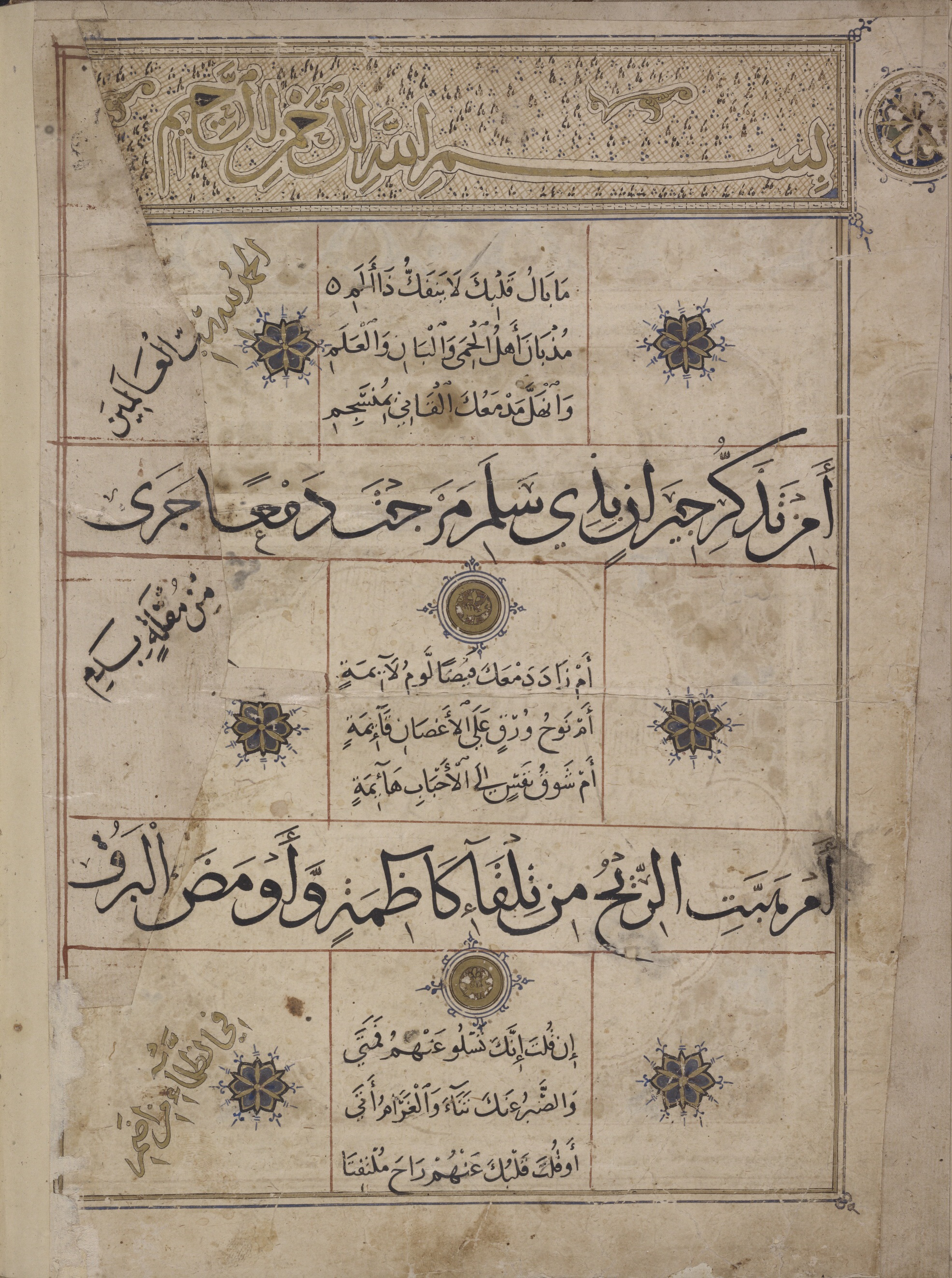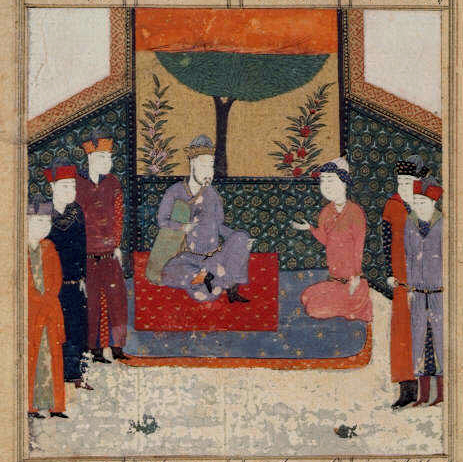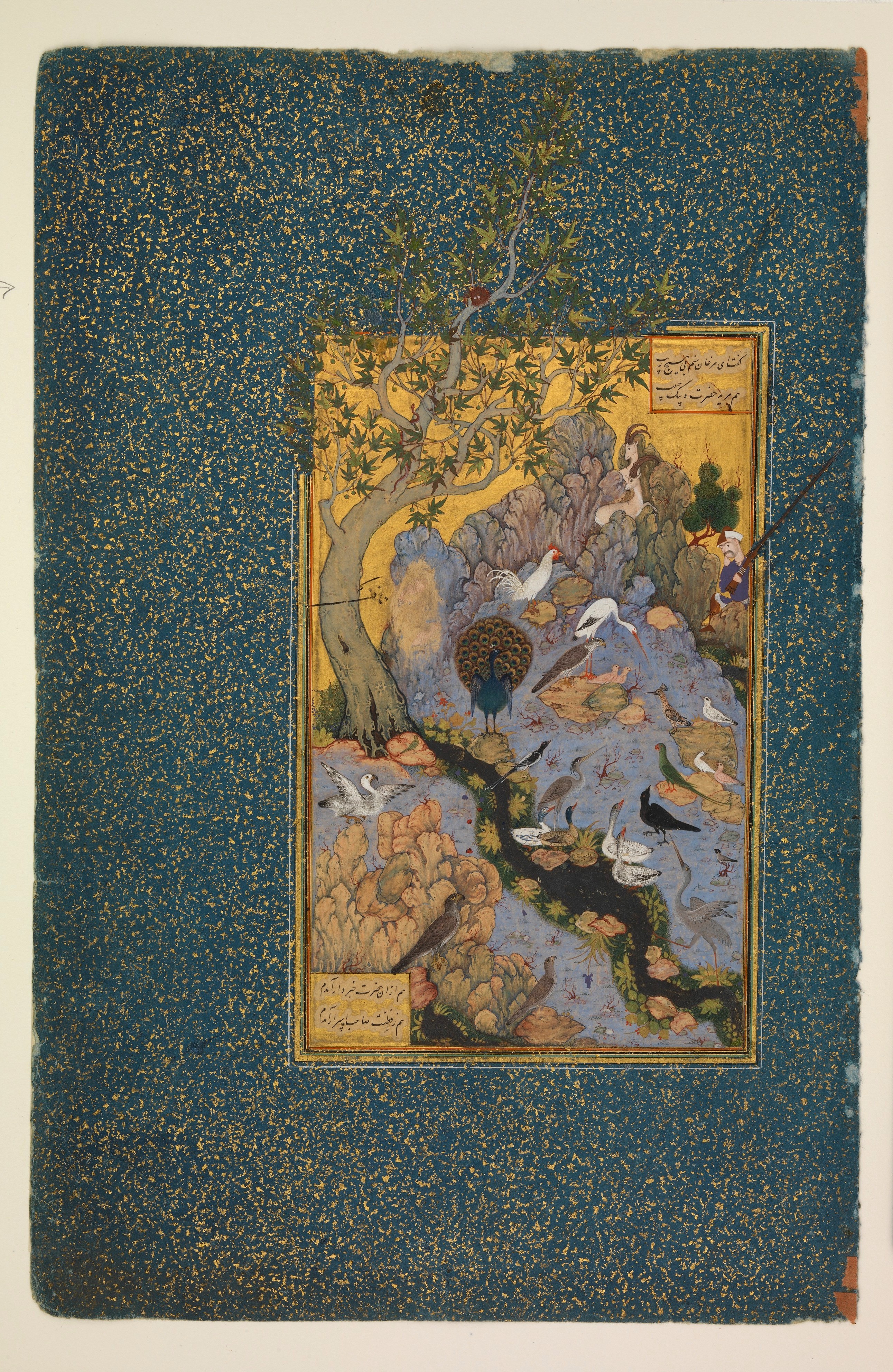|
Sheikh San'Aan
"Sheikh San'Aan" or "San'Aan" is the title of a Persian mystical poem written by the Persian Sufi poet Farid ud-Din Attar. "Sheikh San'Aan" is the longest story in the book '' The Conference of the Birds''. Synopsis Sheikh San'Aan, an old man, is highly devout and the leader of his people. He has lived in Kaaba for about fifty years, accepting disciples and praying and fasting continuously. He has performed the Hajj fifty times and discovered many spiritual secrets. One day, he has a dream that he is settled in Rûm and bowing to an idol. This dream repeats over several consecutive nights. He travels to Rûm with his disciples, where he meets a Christian woman and falls in love with her, spending over a month begging for her acceptance. The woman comes up with four conditions for the sheikh: bow to the idol, burn the Quran, start drinking wine and abandon the faith. In addition to fulfilling these conditions, San'Aan shepherds her pigs for a year to pay th ... [...More Info...] [...Related Items...] OR: [Wikipedia] [Google] [Baidu] |
Persian Language
Persian (), also known by its endonym and exonym, endonym Farsi (, ', ), is a Western Iranian languages, Western Iranian language belonging to the Iranian languages, Iranian branch of the Indo-Iranian languages, Indo-Iranian subdivision of the Indo-European languages. Persian is a pluricentric language predominantly spoken and used officially within Iran, Afghanistan, and Tajikistan in three mutual intelligibility, mutually intelligible standard language, standard varieties, namely Iranian Persian (officially known as ''Persian''), Dari, Dari Persian (officially known as ''Dari'' since 1964) and Tajik language, Tajiki Persian (officially known as ''Tajik'' since 1999).Siddikzoda, S. "Tajik Language: Farsi or not Farsi?" in ''Media Insight Central Asia #27'', August 2002. It is also spoken natively in the Tajik variety by a significant population within Uzbekistan, as well as within other regions with a Persianate society, Persianate history in the cultural sphere of Greater Ira ... [...More Info...] [...Related Items...] OR: [Wikipedia] [Google] [Baidu] |
Muhammad
Muhammad ( ar, مُحَمَّد; 570 – 8 June 632 CE) was an Arab religious, social, and political leader and the founder of Islam. According to Islamic doctrine, he was a prophet divinely inspired to preach and confirm the monotheistic teachings of Adam, Abraham, Moses, Jesus, and other prophets. He is believed to be the Seal of the Prophets within Islam. Muhammad united Arabia into a single Muslim polity, with the Quran as well as his teachings and practices forming the basis of Islamic religious belief. Muhammad was born approximately 570CE in Mecca. He was the son of Abdullah ibn Abd al-Muttalib and Amina bint Wahb. His father Abdullah was the son of Quraysh tribal leader Abd al-Muttalib ibn Hashim, and he died a few months before Muhammad's birth. His mother Amina died when he was six, leaving Muhammad an orphan. He was raised under the care of his grandfather, Abd al-Muttalib, and paternal uncle, Abu Talib. In later years, he would periodically seclud ... [...More Info...] [...Related Items...] OR: [Wikipedia] [Google] [Baidu] |
Persian Literature
Persian literature ( fa, ادبیات فارسی, Adabiyâte fârsi, ) comprises oral compositions and written texts in the Persian language and is one of the world's oldest literatures. It spans over two-and-a-half millennia. Its sources have been within Greater Iran including present-day Iran, Iraq, Afghanistan, the Caucasus, and Turkey, regions of Central Asia (such as Tajikistan) and South Asia where the Persian language has historically been either the native or official language. For example, Rumi, one of the best-loved Persian poets, born in Balkh (in modern-day Afghanistan) or Wakhsh (in modern-day Tajikistan), wrote in Persian and lived in Konya (in modern-day Turkey), at that time the capital of the Seljuks in Anatolia. The Ghaznavids conquered large territories in Central and South Asia and adopted Persian as their court language. There is thus Persian literature from Iran, Mesopotamia, Azerbaijan, the wider Caucasus, Turkey, Pakistan, Bangladesh, India, Tajik ... [...More Info...] [...Related Items...] OR: [Wikipedia] [Google] [Baidu] |
Sufi Literature
Sufi literature consists of works in various languages that express and advocate the ideas of Sufism. Sufism had an important influence on medieval literature, especially poetry, that was written in Arabic, Persian, Turkic and Urdu. Sufi doctrines and organizations provided more freedom to literature than did the court poetry of the period. The Sufis borrowed elements of folklore in their literature. The works of Nizami, Nava'i, Hafez, Sam'ani and Jami were more or less related to Sufism. The verse of such Sufi poets as Sanai (died c. 1140), Attar (born c. 1119), and Rumi (died 1273) protested against oppression with an emphasis on divine justice and criticized evil rulers, religious fanaticism and the greed and hypocrisy of the orthodox Muslim clergy. The poetic forms used by these writers were similar to the folk song, parable and fairy tale. Background Sufi literature written in Persian flourished from the 12th to 15th centuries. Later major poets linked with the Sufi tra ... [...More Info...] [...Related Items...] OR: [Wikipedia] [Google] [Baidu] |
Tariq Ut-tahqiq
Tariq ut-tahqiq is one of the books attributed to Hakim Sanai Ghaznavi. This is The old Persian mystical poetry book from year 528 AH in Masnavi form. This book was published in Persian by Mohammad Taghi Modarres Razavi under the name "Masnavi of Sanai" in 1969 with association of the University of Tehran Press.Bo Utas, ''Tariq ut-tahqiq.'' A Sufi Mathnavi ascribed to Hakim Sana’i of Ghazna and probably composed by Ahmad b. al-Hasan b. Muhammad an-Naxcavani. A critical edition, with a history of the text and a commentary (Scandinavian Institute of Asian Studies Monograph Series, 13), Lund 1973. 243, 55 pp.Bo Utas, ''A Persian Sufi Poem: Vocabulary and Terminology''. Scandinavian Institute of Asian Studies Monograph Series, Curzon Press, 1977. Sample poem For example, a poem called ''Litany'' from this book translated to english as follows: See also * Hadiqat al Haqiqa * Seir al-Ebad elal-Ma'ad * Karnameye Balkh * Karname-ye Ardeshir-e Babakan * Matigan ... [...More Info...] [...Related Items...] OR: [Wikipedia] [Google] [Baidu] |
Maghrebi Tabrizi
Mohammad Shirin Maghrebi Tabrizi, known as Shirin or Mullah Mohammad Shirin also known as Shams Maghrebi lived between years 1348 AD until 1406 AD (749-809 AH), is an Iranian poet and a Mystic and a Sufi of the second half of the eighth century AH. The reason for his fame and nickname to the Maghrebi is considered by some to be his trip to Morocco (called Maghreb in Persian) and wearing a cloak by one of Ibn Arabi's relatives. Maghrebi in his beliefs was a follower of Ismaeel Sisi and was a good fellow of Noureddin Abdul Rahman Esfarayeni and a companion of Kamal Khujandi. In addition to Ismaeel Sisi, his other teachers are: Baha'uddin Hamedani, Mohiuddin Ibn Arabi, Sa'ad al-Din Tabrizi and Abdul Momen Saravi. Some have attributed him to the method of Suhrawardiyya or Marufieh. Although some of his teachers were raised to be followers of the first tradition, his works indicate that he was strongly interested in the second tradition and the views ... [...More Info...] [...Related Items...] OR: [Wikipedia] [Google] [Baidu] |
Karnameye Balkh
Karnameye Balkh or Karname-ye Balkh (title means ''workbook of Balkh'') is one of the works of Sanai and it contain his poet's composed when he stop in Balkh city. It is about five hundred verses and because it was written through some jokes, it has also been called the Humor letter (Motayebe Nameh). In this work, the poet deals with some aspects of his life and his father and some of his contemporaries. This work has been corrected and published by Mohammad Taghi Modarres Razavi in Persian. See also * Hadiqat al Haqiqa * Seir al-Ebad elal-Ma'ad * Tariq ut-tahqiq * Karname-ye Ardeshir-e Babakan * Matigan-i Hazar Datistan * Sheikh San'Aan "Sheikh San'Aan" or "San'Aan" is the title of a Persian mystical poem written by the Persian Sufi poet Farid ud-Din Attar. "Sheikh San'Aan" is the longest story in the book '' The Conference of the Birds''. Synopsis Sheikh San'Aan, an old ... References External links SANĀʾI on iranicaonlineSanai's books on GoodreadsHak ... [...More Info...] [...Related Items...] OR: [Wikipedia] [Google] [Baidu] |
Attar Of Nishapur
Abū Ḥamīd bin Abū Bakr Ibrāhīm (c. 1145 – c. 1221; fa, ابو حامد بن ابوبکر ابراهیم), better known by his pen-names Farīd ud-Dīn () and ʿAṭṭār of Nishapur (, Attar means apothecary), was a PersianRitter, H. (1986), “Attar”, Encyclopaedia of Islam, New Ed., vol. 1: 751-755. Excerpt: "ATTAR, FARID AL-DIN MUHAMMAD B. IBRAHIM.Persian mystical poet.Farīd al-Dīn ʿAṭṭār, in Encyclopædia Britannica, online edition - accessed December 2012./ref> poet, theoretician of Sufism, and hagiographer from Nishapur who had an immense and lasting influence on Persian poetry and Sufism. He wrote a collection of lyrical poems and number of long poems in the philosophical tradition of Islamic mysticism, as well as a prose work with biographies and sayings of famous Muslim mystics. Manṭiq-uṭ-Ṭayr (''The Conference of the Birds)'' and '' Ilāhī-Nāma'' (''The Book of Divine)'' and Memorial of the Saints are among his best known works. Biograph ... [...More Info...] [...Related Items...] OR: [Wikipedia] [Google] [Baidu] |
Muslim
Muslims ( ar, المسلمون, , ) are people who adhere to Islam, a monotheistic religion belonging to the Abrahamic tradition. They consider the Quran, the foundational religious text of Islam, to be the verbatim word of the God of Abraham (or ''Allah'') as it was revealed to Muhammad, the main Islamic prophet. The majority of Muslims also follow the teachings and practices of Muhammad (''sunnah'') as recorded in traditional accounts ('' hadith''). With an estimated population of almost 1.9 billion followers as of 2020 year estimation, Muslims comprise more than 24.9% of the world's total population. In descending order, the percentage of people who identify as Muslims on each continental landmass stands at: 45% of Africa, 25% of Asia and Oceania (collectively), 6% of Europe, and 1% of the Americas. Additionally, in subdivided geographical regions, the figure stands at: 91% of the Middle East–North Africa, 90% of Central Asia, 65% of the Caucasus, 42% of South ... [...More Info...] [...Related Items...] OR: [Wikipedia] [Google] [Baidu] |
Mahr
In Islam, a mahr (in ar, مهر; fa, مهريه; tr, mehir; sw, mahari; also transliterated ''mehr'', ''meher'', ''mehrieh'', or ''mahriyeh'') is the obligation, in the form of money or possessions paid by the groom, to the bride at the time of Islamic marriage (payment also has circumstances on when and how to pay). While the ''mahr'' is often money, it can also be anything agreed upon by the bride such as jewelry, home goods, furniture, a dwelling or some land. Mahr is typically specified in the marriage contract signed upon marriage. "Dower" is the English translation that comes closest to Islamic meaning of mahr, as "dower" refers to the payment from the husband or his family to the wife, especially to support her in the event of his death, although subsequent to marriage the wife also acquires inheritance rights. However, mahr is distinct from dower in two ways: 1) mahr is legally required for all Islamic marriages while dower is optional, and 2) mahr is required to be ... [...More Info...] [...Related Items...] OR: [Wikipedia] [Google] [Baidu] |
Farid Ud-Din Attar
Abū Ḥamīd bin Abū Bakr Ibrāhīm (c. 1145 – c. 1221; fa, ابو حامد بن ابوبکر ابراهیم), better known by his pen-names Farīd ud-Dīn () and ʿAṭṭār of Nishapur (, Attar means apothecary), was a PersianRitter, H. (1986), “Attar”, Encyclopaedia of Islam, New Ed., vol. 1: 751-755. Excerpt: "ATTAR, FARID AL-DIN MUHAMMAD B. IBRAHIM.Persian mystical poet.Farīd al-Dīn ʿAṭṭār, in Encyclopædia Britannica, online edition - accessed December 2012./ref> poet, theoretician of Sufism, and hagiographer from Nishapur who had an immense and lasting influence on Persian poetry and Sufism. He wrote a collection of lyrical poems and number of long poems in the philosophical tradition of Islamic mysticism, as well as a prose work with biographies and sayings of famous Muslim mystics. Manṭiq-uṭ-Ṭayr (''The Conference of the Birds)'' and '' Ilāhī-Nāma'' (''The Book of Divine)'' and Memorial of the Saints are among his best known works. Biography ... [...More Info...] [...Related Items...] OR: [Wikipedia] [Google] [Baidu] |
Quran
The Quran (, ; Standard Arabic: , Quranic Arabic: , , 'the recitation'), also romanized Qur'an or Koran, is the central religious text of Islam, believed by Muslims to be a revelation from God. It is organized in 114 chapters (pl.: , sing.: ), which consist of verses (pl.: , sing.: , cons.: ). In addition to its religious significance, it is widely regarded as the finest work in Arabic literature, and has significantly influenced the Arabic language. Muslims believe that the Quran was orally revealed by God to the final prophet, Muhammad, through the archangel Gabriel incrementally over a period of some 23 years, beginning in the month of Ramadan, when Muhammad was 40; and concluding in 632, the year of his death. Muslims regard the Quran as Muhammad's most important miracle; a proof of his prophethood; and the culmination of a series of divine messages starting with those revealed to Adam, including the Torah, the Psalms and the Gospel. The word ''Quran'' occurs some ... [...More Info...] [...Related Items...] OR: [Wikipedia] [Google] [Baidu] |








